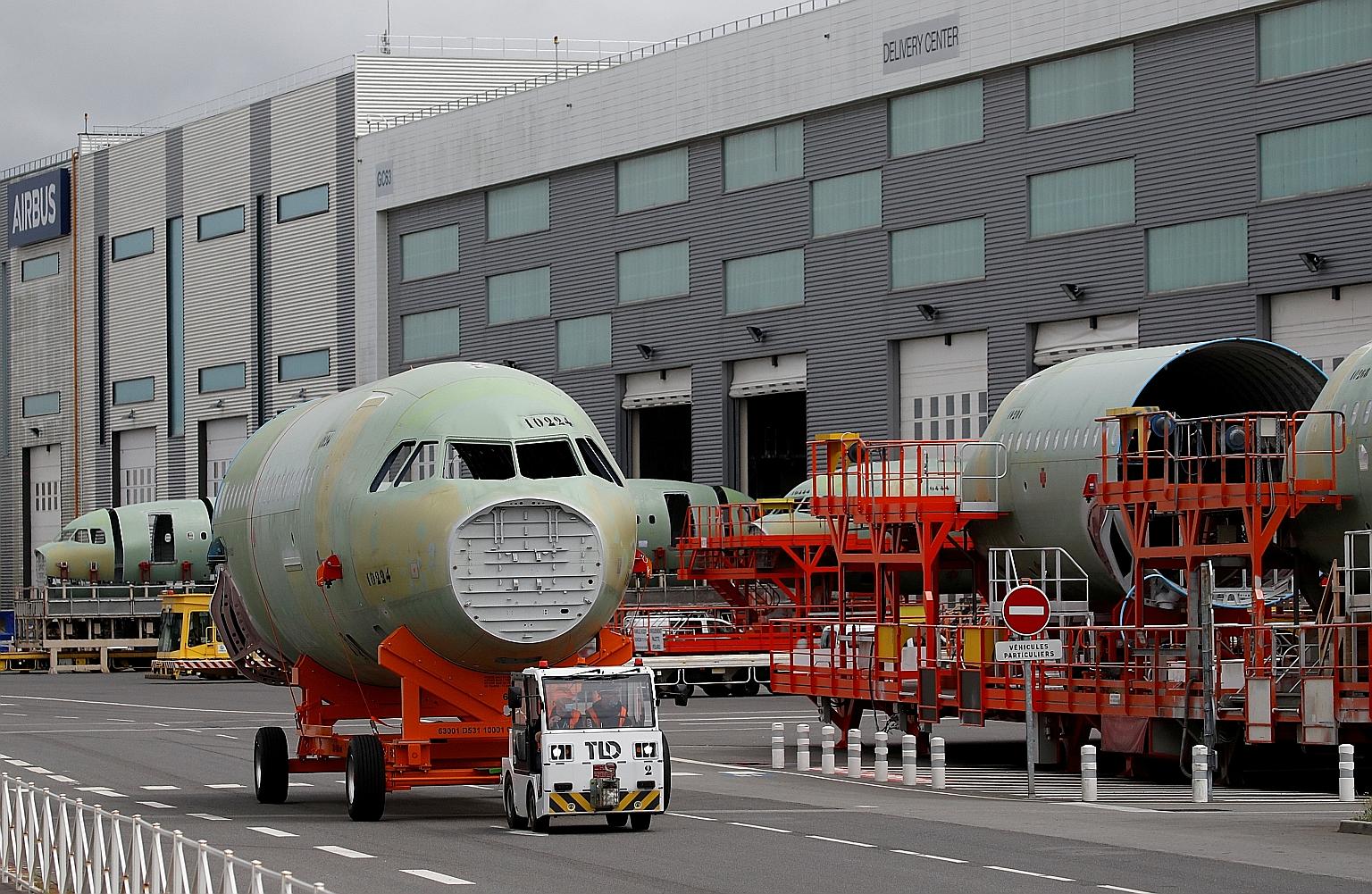Air traffic to soar despite climate concerns
Expected to double to 8.5b in 2039 from 2019, despite bid to cut carbon footprint
Sign up now: Get ST's newsletters delivered to your inbox

The fuselage section of an Airbus A320 being transported at the Airbus facility in Montoir-de-Bretagne near Saint-Nazaire, France, on July 1 last year. Airbus has already announced it plans to step up the manufacturing cadence of its best-selling single-aisle A320 and should reach a record level in 2023.
PHOTO: REUTERS
Follow topic:
PARIS • After flying into the financial turbulence of the Covid-19 pandemic, the airline sector expects passenger traffic to take off despite concerns about the industry's impact on climate change.
In its latest look at trends for the sector, the International Air Transport Association (Iata) said it does not expect global air traffic to resume to its pre-pandemic level before 2023.
But over 20 years, air traffic should almost double, from 4.5 billion passengers in 2019 to 8.5 billion in 2039. That is, however, a drop of one billion passengers from Iata's pre-crisis forecast.
That will still be good news for aircraft manufacturers, which slowed down production during the crisis as airlines cancelled orders to stay financially afloat.
Airbus has already announced it plans to step up the manufacturing cadence of its best-selling single-aisle A320 and should reach a record level in 2023.
Boeing forecasts that airlines will need 43,110 new aircraft through 2039, which will result in a near doubling of the global fleet. Asia alone will account for 40 per cent of that demand.
Dr Marc Ivaldi, research director at the Paris-based School for Advanced Studies in the Social Sciences, noted that only 1 per cent of the global population currently use air travel. "With the simple demographic rise and the fact that people become richer, there will be rising demand for air travel and thus for aircraft," he said.
If the biggest aircraft fleets are currently in the United States and Europe, the biggest increases are expected in Asia and the Middle East, consulting firm Oliver Wyman said in a recent study.
Airbus delivered 19 per cent of its planes to China, more than to the US, and this trend is not expected to change.
In many emerging countries where the middle class is expanding, air travel is becoming possible for more and more people.
"Among Asia's emerging nations, one of the greatest aspirational goals is simply the ability to fly internationally," said the Centre for Aviation. "It is a sign of social and economic maturity and permits experiences which were unthinkable for their parents."
It noted that these people were unlikely to share the growing sentiment among some people in the West towards reducing air travel to reduce one's carbon footprint.
"For these new would-be fliers, the whole concept of 'flight shaming' at a grassroots level is grossly alien," said the Centre for Aviation. "Consequently, in Asia, flight shaming is unlikely to gain much traction," it added.
The "flight shaming" or "flygskam" movement took off in Sweden in 2018 to challenge the growing popularity of air travel, which had boomed in Europe thanks to budget airlines that made weekend getaways across the continent affordable to a wider public.
In 2019, air traffic declined by 4 per cent in Sweden, but it hit a record across Europe, according to air traffic control body Eurocontrol.
Meanwhile, the number of daily US air travellers has exceeded two million for the first time since the coronavirus pandemic began, reaching almost three-quarters of the volume recorded on the same day in 2019, according to the Transportation Security Administration (TSA).
Last Friday's total is part of a trend towards improving numbers since February, when vaccinations against the virus in the United States began to have an appreciable effect and cases started plummeting.
The pent-up demand has pushed up airfares for the peak summer travel season, as flight schedules have yet to be adjusted for Americans' return to the skies.
TSA officials screened 2,028,961 people at airport security checkpoints last Friday, 1.5 million more than on the same day a year ago and 74 per cent of the number from 2019 or two years ago, the agency said in a statement.
AGENCE FRANCE-PRESSE, BLOOMBERG

